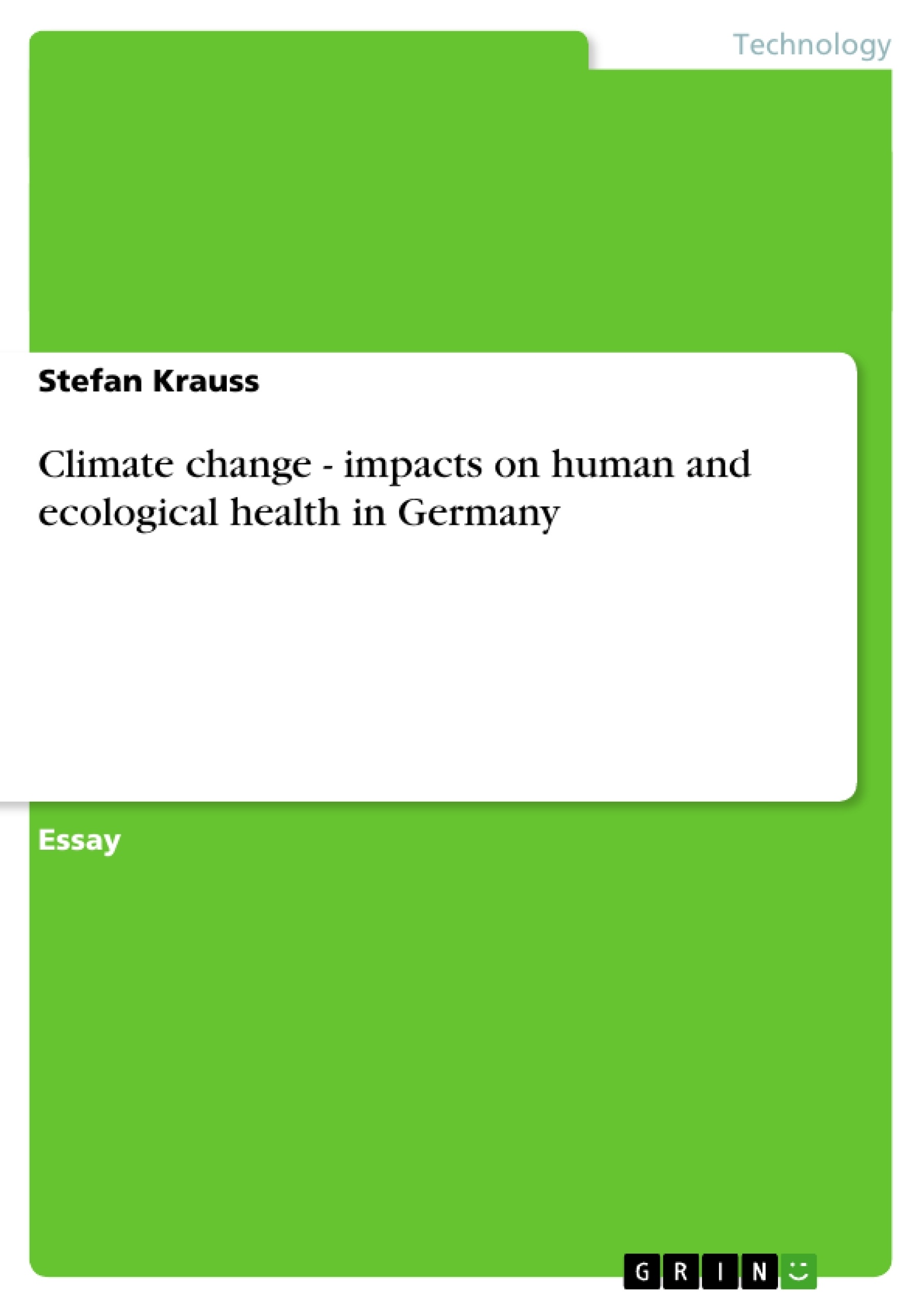In these days, global climatic changes that can be observed are rooted in human activities. The prevailing carbon-based economy makes issues like heating and electricity, population growth and industrialisation, transportation and mobility, over-consumption and globalisation the main contributors of emission of greenhouse gases, with the consequence (among others) of global warming, and thus a changing climate. These global changes have heightened awareness that the health of populations depends on the stability and functioning of the biosphere’s ecological, physical, and socio-economic systems. The world’s climate system is an integral part of the complex web of life-supporting processes. Climate and weather have always had a powerful impact on human health and well-being. But like other large natural systems, the global climate system is coming under pressure from human activities. Global climate change is, therefore, a newer challenge to ongoing efforts to protect human health.
This essay examines the mentioned connectedness of human behaviour and the natural world. More specifically, it deals with the global issue of human induced climate change and its impacts on ecological health and human health , focusing on Germany. Following on from this, global and German mitigation policies are introduced and the health benefits are outlined. The starting point marks a brief discussion of the link between greenhouse gases and climate change. In connection with the issues of the ′greenhouse effect′ and ′climate change′, stratospheric ozone depletion is often also discussed. Undoubtedly, stratospheric ozone depletion has impacts on ecological and human health, however it is left out of consideration in this essay due to the word limit, and to the complexity of its relationship to the greenhouse effect and climate change. [...]
Inhaltsverzeichnis (Table of Contents)
- INTRODUCTION
- THE GREENHOUSE EFFECT AND CLIMATE CHANGE
- CLIMATE CHANGE IMPACTS ON ECOLOGICAL HEALTH..
- IMPACTS ON ECOSYSTEMS..
- Temperature, precipitation, and carbon dioxide.
- Shift of the vegetation zones.
- Composition of species and biodiversity.
- IMPACTS ON LANDSCAPE
- IMPACTS ON ECOSYSTEMS..
- CLIMATE CHANGE IMPACTS ON HUMAN HEALTH.
- DIRECT IMPACTS
- Thermal extremes.
- Weather extremes.
- INDIRECT IMPACTS
- Vector-borne diseases...
- Impacts on food supply...
- DIRECT IMPACTS
- POLICIES IN GERMANY
- MITIGATION OF CLIMATE CHANGE AND ITS HEALTH BENEfits
- MITIGATION ON A GLOBAL SCALE
- HEALTH BENEFITS
- SUMMARY AND OUTLOOK
Zielsetzung und Themenschwerpunkte (Objectives and Key Themes)
This essay aims to explore the interconnectedness between human behavior and the natural world. Specifically, it examines the global issue of human-induced climate change and its impacts on ecological health and human health, with a focus on Germany. The essay explores global and German mitigation policies and their health benefits. Additionally, it briefly discusses the link between greenhouse gases and climate change. * The connection between human activities and global climate change. * The effects of climate change on ecological health, including impacts on ecosystems and landscapes. * The health implications of climate change, encompassing both direct and indirect impacts on human well-being. * Mitigation policies in Germany and on a global scale to address climate change. * The potential health benefits of climate change mitigation efforts.Zusammenfassung der Kapitel (Chapter Summaries)
- Introduction: The essay establishes the link between human activities, climate change, and its consequences for ecological and human health. It highlights the importance of a stable biosphere for human well-being.
- The Greenhouse Effect and Climate Change: This section explains the natural greenhouse effect and its role in maintaining Earth's temperature. It details the impact of human-induced greenhouse gas emissions on global warming and climate change.
- Climate Change Impacts on Ecological Health: This section analyzes the effects of climate change on ecosystems, including temperature, precipitation, and carbon dioxide levels. It explores the shifts in vegetation zones and the impacts on species composition and biodiversity.
- Climate Change Impacts on Human Health: This section delves into the direct and indirect impacts of climate change on human health. It examines the consequences of thermal extremes, weather extremes, and the spread of vector-borne diseases.
Schlüsselwörter (Keywords)
The essay centers around the interconnectedness of human activities, climate change, ecological health, and human well-being. Key terms include greenhouse gases, climate change mitigation, global warming, ecosystem health, biodiversity, vector-borne diseases, and health benefits of mitigation policies. These keywords reflect the essay's focus on understanding the complex interactions between human behavior, environmental changes, and their implications for human and ecological health.Frequently Asked Questions
How does human activity contribute to climate change?
Human activities, such as industrialization, transportation, and energy production, increase the emission of greenhouse gases, leading to global warming and climate change.
What are the direct impacts of climate change on human health?
Direct impacts include health issues related to thermal extremes (heatwaves) and injuries or deaths caused by extreme weather events.
How does climate change affect biodiversity in Germany?
Changes in temperature and precipitation lead to shifts in vegetation zones and can alter the composition of species, threatening local biodiversity.
What are indirect health impacts of global warming?
Indirect impacts include the spread of vector-borne diseases (like those carried by ticks or mosquitoes) and disruptions to the food supply.
What are the benefits of climate mitigation policies?
Mitigation efforts not only stabilize the environment but also offer significant health benefits by reducing air pollution and preventing extreme weather-related health crises.
- Citar trabajo
- Stefan Krauss (Autor), 2004, Climate change - impacts on human and ecological health in Germany, Múnich, GRIN Verlag, https://www.grin.com/document/33782



